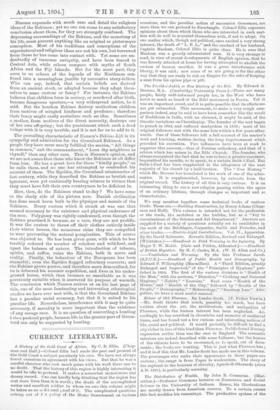The Tctrikh - i - Tadid, or New History of the Bdb. By Edward
G Browne, 'LILA. (Cambridge University Press.)—There are many people, fairly well-informed people too, in the West who have never so much as heard of the Blibi movement in Persia. Yet it was an important event, and it is quite possible that its effects are not yet exhausted. This movement, to make a very rough com- parison indeed, may be said to have been somewhat like the revolt of Buddhism in India, with an element, it might be said, of the Gnostic variations on Christianity. The founder of the sect began to preach in 1844, and suffered martyrdom in 1850; most of his original followers met with the same fate within a few years after- wards. One of these followers left a full account of his master's work and teaching, written during the long imprisonment which preceded his execution. Two influences have been at work to suppress this account,—that of Persian orthodoxy, and that of a schism which has arisen in the Bari Church. The founder, who always recognised the fact that he was to have a greater successor, bequeathed his mantle, so to speak, to a certain Subh-i-Ezel. But Subh-i-Ezel has been supplanted in the allegiance of the vast majority of his church by a half-brother. The "New History" which Mr. Browne has translated is the work of one of the schis- matics. It is supplemented, however, by extracts from the original record. The history of all this is very curious. It is an interesting thing to see a new religion passing within the space of an ordinary lifetime, through changes so important and so characteristic.


































 Previous page
Previous page